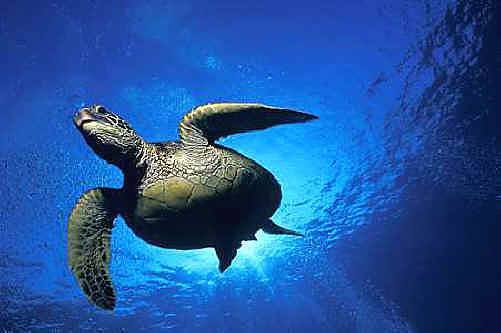Environmental Groups: Federal Government Tried to Hide Serious Harm to Endangered Species from Industrial Cooling Systems
By: Waterkeeper Alliance

Ask court to compel agencies to release original biological opinion finding EPA’s cooling water rule will jeopardize endangered species
NEW YORK, NY – October 26, 2015 – In a case challenging a 2014 federal rule governing industrial cooling systems, 21 environmental groups from across the country are asking a U.S. Court of Appeals to compel the U.S. Environmental Protection Agency’s (EPA), U.S. Fish and Wildlife Service and National Marine Fisheries Service (“the Services”) to turn over documents showing that the Services’ scientists decided that EPA’s rule would jeopardize threatened or endangered species.
By law, EPA was required to ask the Services for their scientific views on the cooling water rule. In December 2013, after months of careful study, the Services prepared a draft Biological Opinion finding that EPA’s rule would jeopardize the existence and damage the critical habitat of endangered species. The Services sent EPA a set of “reasonable and prudent alternatives” suggesting how the agency should change its rule to avoid placing species in jeopardy.
Under a court order to issue this long-delayed rule, EPA asked a judge for multiple deadline extensions while it tried to get the Services’ “jeopardy” call reversed. After six months of negotiations involving the Services, the Department of Justice and the White House, the Services reversed course and issued a Biological Opinion finding of “no jeopardy” to endangered species just three hours before the final deadline.
“The administrative record the agencies presented to the court is demonstrably incomplete and a fictional account of the Services’ actual decision-making process,”said Reed Super, the attorney for the environmental groups who filed the Motion to Compel Completion of Administrative Records on October 21, 2015. “We are seeking a court order requiring production of the pertinent documents within 10 days of the order.”
EPA’s rule allows more than 1,000 power plants and factories across the country to withdraw massive volumes of water for their industrial cooling systems — 75 trillion gallons per year — from lakes, rivers and harbors. These cooling systems kill 500 billion organisms annually, and are responsible for the release of immense amounts of waste heat into our waterways. They affect 266 threatened or endangered species and are degrading nearly 300 habitats designated as critical to species recovery by the Fish and Wildlife Service and National Marine Fisheries Service.
“EPA’s actions appear to allow political pressure and magical thinking to trump science,” said Marc Yaggi, executive director of Waterkeeper Alliance. “We cannot allow our precious waterways and endangered species to be decimated by government agencies operating under a veil of secrecy to hide the immense, irreversible damage that will be inflicted by this rule.”
“Every day, hundreds of endangered species are boiled alive or crushed by power plant intake pipes,” said Brett Hartl of the Center for Biological Diversity. “Yet, federal agencies have not only refused to protect these species but are now trying to cover their actions by preventing critical documents from being reviewed in court.”
“In the Delaware River just one facility alone is killing over 14 billion fish at all life stages every year, including endangered species. The unparalleled level of environmental harm inflicted by these cooling water intake structures is, for the most part, avoidable. That our natural resource agencies would hide information that documents and demonstrates the irreparable harm being inflicted on our environment and public resources is not just unconscionable, it is a violation of their duty to protect the public and the environment over corporate and political interests,” said Maya van Rossum, the Delaware Riverkeeper and leader of the Delaware Riverkeeper Network.
“Cooling water intake structures impose enormous impacts on aquatic organisms and the marine environment. Industrial factories and power plants in New York and New Jersey, and across the country, are killing billions of fish and wreaking havoc on our critically important ecosystems. EPA must require the use of the best available technology and stop catering to industry interests at the expense of our environment,” said Andrea Leshak, staff attorney at NY/NJ Baykeeper.
“This case is about using the best available science to protect endangered fish and wildlife, including Puget Sound Chinook salmon and our resident orca whales, both for the integrity of our natural world and as a resource for everyone to enjoy,” said Chris Wilke, Puget Soundkeeper, in Seattle, WA. “I’m troubled that the agency would disregard their own scientific findings. To see those tasked with upholding our environmental laws second guessing science and violating public trust for the sake of political expediency undermines the very purpose of laws intended to protect our waters and the many species fighting for survival.”
Chris Len, Hudson River Program Director at Riverkeeper, added: “Despite decreasing fishing pressure, our data show that the iconic fish species in the Hudson River decline every year, mostly due to antiquated cooling technology on power plants. EPA knows how to fix this, it’s the agency’s job to fix this, and it’s time they did their job.”
The motion was filed on behalf of: American Littoral Society, California Coastkeeper Alliance, Center for Biological Diversity, Environment America, Environment Massachusetts, Casco Baykeeper, Delaware Riverkeeper Network, Hackensack Riverkeeper, Humboldt Baykeeper, Louisiana Environmental Action Network, Natural Resources Defense Council, NY/NJ Baykeeper, Puget Soundkeeper Alliance, Riverkeeper, Inc., Save The Bay – Narragansett Bay, Scenic Hudson, Sierra Club, Soundkeeper, Suncoast Waterkeeper, Inc., Surfrider and Waterkeeper Alliance.
The case is being heard before the United States Court of Appeals for the Second Circuit in 2016. Unless the Court of Appeals extends the time to respond, the EPA and the Services must respond to the Environmental groups’ motion on November 1, 2015.
Contacts:
Tina Posterli, Waterkeeper Alliance, 516-526-9371, [email protected]
Brett Hartl, Center for Biological Diversity, 202-817-8121, [email protected]
Maya van Rossum, Delaware Riverkeeper Network, 215-369-1188, x 102 (cell & office), [email protected]
Andrea Leshak, NY/NJ Baykeeper, 732-888-9870 ext. 5, [email protected]
Chris Wilke, Puget Soundkeeper Alliance, 206-297-7002, [email protected]
###